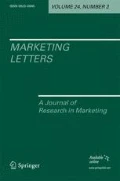Abstract
Recent evidence at the intersection of pharmacology and psychology suggests that pharmaceutical products and other drugs can exert previously unrecognized effects on consumers’ judgments, emotions, and behavior. We highlight the importance of a wider perspective for marketing science by proposing novel questions about how drugs might influence consumers. As a model for this framework, we review recently discovered effects of the over-the-counter pain reliever acetaminophen, which can alter consumers’ emotional experiences and their economic behavior well beyond soothing their aches and pains, and also present novel data on its memory effects. Observing effects of putatively benign over-the-counter medicines that extend beyond their originally approved usages suggests that many other drugs are also likely to influence processes relevant for consumers. The ubiquity of drug consumption—medical or recreational, legal or otherwise—underscores the importance of considering several novel research directions for understanding pharmacological-psychological interactions on consumer judgments, emotions, and behaviors.
References
DeWall, C. N., MacDonald, G., Webster, G. D., Masten, C. L., Baumeister, R. F., Powell, C., Combs, D., Schurtz, D. R., Stillman, T. F., Tice, D. M., & Eisenberger, N. I. (2010). Acetaminophen reduces social pain: behavioral and neural evidence. Psychological Science, 21, 931–937.
Durso, G. R. O., Luttrell, A., & Way, B. M. (2015). Over-the-counter relief from pains and pleasures alike: acetaminophen blunts evaluation sensitivity to both negative and positive stimuli. Psychological Science, 26, 750–758.
Ferrer, R., Klein, W., Lerner, J., Reyna, V., & Keltner, D. (2015). Emotions and health decision-making: extending the appraisal tendency framework to improve health and healthcare. In C. Roberto & I. Kawachi (Eds.), Behavioral economics and public health. Cambridge: Harvard University Press.
Kaufman, D. W., Kelly, J. P., Rosenberg, L., Anderson, T. E., & Mitchell, A. A. (2002). Recent patterns of medication use in the ambulatory adult population of the United States: the Slone survey. Journal of the American Medical Association (JAMA), 287(3), 337–344.
Mischkowski, D., Crocker, J., & Way, B. M. (2019). A social analgesic? Acetaminophen (paracetamol) reduces positive empathy. Frontiers in Psychology, 10, 538.
Randles, D., Heine, S. J., & Santos, N. (2013). The common pain of surrealism and death: acetaminophen reduces compensatory affirmation following meaning threats. Psychological Science, 24(6), 966–973.
Roberts, I. D., Krajbich, I., & Way, B. M. (2019). Acetaminophen influences social and economic trust. Nature Scientific Reports, 9, 4060.
Stremersch, S. (2008). Health and marketing: the emergence of a new field of research. International Journal of Research in Marketing, 25(4), 229–233.
Way, B. M., & Keaveney, A. (2018). Neurochemical contributions to interpersonal emotion dynamics. In A. K. Randall & D. Schoebi (Eds.), Interpersonal emotion dynamics in personal relationships. Cambridge: Cambridge University.
Winterich, K. P., & Haws, K. L. (2011). Helpful hopefulness: the effect of future positive emotions on consumption. Journal of Consumer Research, 38(3), 505–524.
Author information
Authors and Affiliations
Corresponding authors
Additional information
Publisher’s note
Springer Nature remains neutral with regard to jurisdictional claims in published maps and institutional affiliations.
Rights and permissions
About this article
Cite this article
Durso, G.R.O., Haws, K.L. & Way, B.M. Drug influences on consumer judgments: emerging insights and research opportunities from the intersection of pharmacology and psychology. Mark Lett 31, 19–23 (2020). https://doi.org/10.1007/s11002-019-09500-z
Published:
Issue Date:
DOI: https://doi.org/10.1007/s11002-019-09500-z

